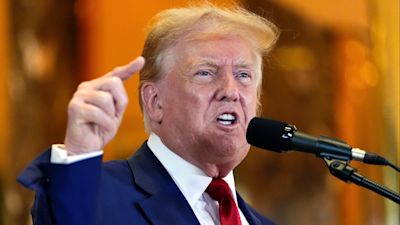Donald Trump's hush money sentencing delayed to September after immunity ruling

The Supreme Court ruled for the first time that former presidents have broad immunity from prosecution, ITV News' US Correspondent Dan Rivers reports.
Donald Trump's sentencing in his hush-money case has been postponed until at least September following the Supreme Court's ruling on presidential immunity.
The delay will be a significant victory for Trump and his lawyers, who asked Judge Juan Merchan, the presiding judge in his hush money trial, to not only postpone his sentencing but also overturn his conviction.
Trump was scheduled for sentencing on July 11 on felony charges of falsifying business records, something he denies.
“The impact of the Immunity Ruling is a loud and clear signal for Justice in the United States,” Trump said on his Truth Social media site.
He also claimed the Supreme Court's decision allows him “total exoneration” in this and other criminal cases he faces.
Trump's sentencing will now take place on September 18 at the earliest.
His lawyers argued that the Supreme Court’s decision confirmed a position the defence raised earlier in the case that prosecutors should have been precluded from introducing some evidence they said constituted official presidential acts, according to the letter.
In prior court filings, Trump contended he is immune from prosecution for conduct alleged to involve official acts during his tenure in office.
His lawyers did not raise that as a defence in the hush money case, but they argued that some evidence - including Trump’s social media posts about former lawyer Michael Cohen - comes from his time as president and should have been excluded from the trial because of immunity protections.
The Supreme Court on Monday ruled for the first time that former presidents have broad immunity from prosecution, extending the delay in the Washington criminal case against Trump on charges he plotted to overturn his 2020 presidential election loss.
President Joe Biden condemned the decision that presidents have absolute immunity from prosecution over core acts - while also warning of the dangers presented by a second Trump term.
“There are no kings in America. Each, each of us is equal before the law. No one, no one is above the law, not even the president of the United States,” Biden said in a speech from the White House.
He added: "It’s a dangerous precedent because the power of the office will no longer be constrained by the law even including the supreme court of the United States.”
Trump was convicted in New York of 34 counts of falsifying business records, arising from what prosecutors said was an attempt to cover up a hush money payment just before the 2016 presidential election. He is scheduled to be sentenced in the hush money case on July 11.
Judge Merchan instituted a policy in the run-up to the trial requiring both sides to send him a one-page letter summarising their arguments before making longer court filings.
In denying Trump’s bid to move the trial from New York state court to federal court last year, a federal judge found that the allegations at the centre of the case pertained to Trump’s personal life, and do not “reflect in any way the color of the President’s official duties.”
“The evidence overwhelmingly suggests that the matter was a purely a personal item of the President - a cover-up of an embarrassing event,” US District Judge Alvin K. Hellerstein wrote in the ruling.
Want a quick and expert briefing on the biggest news stories? Listen to our latest podcast episode to find out What You Need To Know...